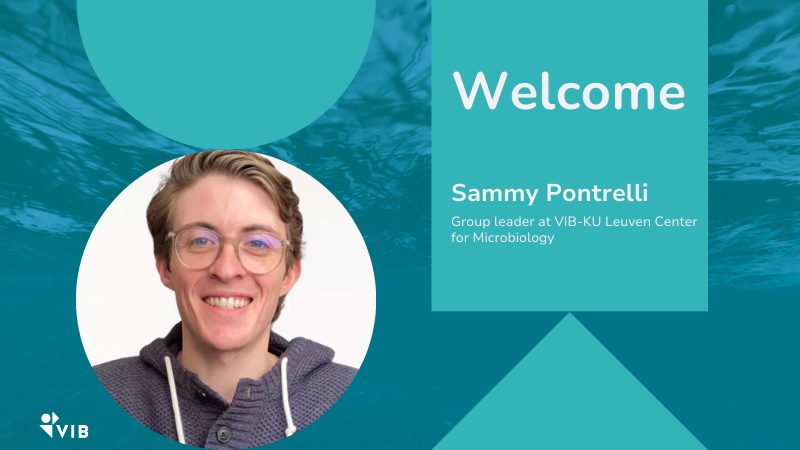Meet Sammy Pontrelli, who looks at marine microbes to learn about carbon sequestration
Sammy joins the VIB-KU Leuven Center for Microbiology as group leader and KU Leuven as Assistant Professor
Following PhD at UCLA (USA) and a postdoc at ETH Zürich (Switzerland), Sammy touched down in Belgium to start his research group in January 2025. The Pontrelli lab - or the lab of microbial metabolic interactions - takes a close look at how marine microbes manage to not only capture carbon from the atmosphere, but also integrate this carbon in stable, persistent molecules that resist degradation.
Time for some questions.
Hi Sammy, what excites you most about starting your lab?
While I’m ecstatic about driving my research, I find myself even more excited about creating my own lab environment. I want to form a place where everyone feels like an integral member, is confident to speak up, and takes pride in their research. As a new PI, I feel a big responsibility to do this. I’m sure I will make mistakes as I go, but the reward of having a happy lab drives me forward!
Marine microbes and carbon sequestration? What are some key questions you want to pursue?
I want to figure out the molecular mechanisms that allow microbes to naturally sequester carbon in the environment. The ocean holds a vast reservoir of dissolved carbon molecules, formed by microbes from atmospheric carbon dioxide. This reservoir of sequestered carbon, which is thousands of years old, rivals the size of the atmospheric carbon pool. The major burning questions for me are: how do microbes produce these molecules? And how do they resist degradation for such long periods?
The scientific community is now making significant progress in identifying these molecules and has discovered millions of distinct forms with remarkably unusual structures. The challenge lies in understanding how microbes, with a limited set of enzymes and metabolic pathways, transform their growth substrates and metabolites into such a diverse array of stable molecular forms outside their typical metabolic networks.

By figuring this out, we'll understand critical factors that govern the global carbon cycle and marine carbon sequestration. Ultimately, the aim is to reveal how environmental changes—like climate change and human activity—impact this molecular reservoir in the ocean. My long-term hope is to provide transferable results to inspire the development of new carbon capture technologies.
Apply for a job at the Pontrelli labIf you could magically master any new skill or area of knowledge overnight, what would it be and why?
I’ve always admired people who can look at a biological system or some results and generate a mathematical framework for how to understand it in a heartbeat. I imagine that adding that kind of brainpower to my wet lab and mass spectrometry experience would be a game-changer. But I guess our brains are all wired differently, and that’s probably a good thing.
On a more far-fetched note, I would love to talk to animals. I know it sounds appealing to ask our cat how its day was, but could you imagine the scientific and social implications of this?! Instead of building super expensive submarines to check out the ocean floor, maybe we could just ask a whale nicely to wear a GoPro. Could we ask our dogs to smell us for cancer, Alzheimer’s, or other diseases that cause the release of volatile organic compounds? Or, instead of spending years trying to figure out why a crab population is mysteriously declining, we could just ask them what’s wrong. I know it’s crazy, but it always makes me smile to think about.
What is the most unexpected or unusual thing that has happened to you in your career so far?
I moved to Belgium. Growing up in California with my family, perpetual sunlight, and breakfast burritos, I would never have expected settling in such a dramatically different place. Moving around is a consequence of pursuing academics, which can be tough. Although, after this fourth big move, I’m happy to have friends all over the world and a collection of cultural memories.
If you had to give a 5-minute TED Talk on something completely unrelated to your field, what would it be about?
I love food, especially food that other people are proud of. This is everywhere in Europe, where every small village has their unique way of cooking something special like nowhere else. I want to stress to the world how important it is to maintain our culinary heritage. With the threat of chain restaurants, takeaway, and homogeneity caused by online trends, the world is forgetting how to cook, and I find it a perilous tragedy that we should avoid!
One non-science-related fact about you?
I come from a long line of Italian-American sausage makers, who have been working in LA for around a century now. I love food, but I’m happy my brother is taking over as heir to the throne, so I can do science.
What is the best (and worst) piece of advice you have ever received?
The best advice: Don’t be discouraged if someone doesn’t like your idea!
While it’s important to take feedback seriously, science is about advancing our understanding of the world. New ideas that challenge existing perspectives are inherently met with criticism. However, ideas need time and refinement, and require grit and constructive feedback which can be difficult to receive. So, I’ve learned that negative feedback means you need to work harder to sharpen your idea, or that you must double down to prove its value to yourself and others.
The worst advice is whatever I allow to discourage me!
Welcome, Sammy!
Want to be kept up-to-date on our biotechnological news and stories? Join our community and subscribe to our bi-monthly newsletter.
.png)


